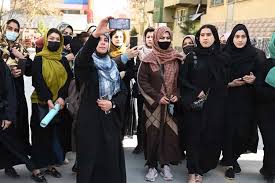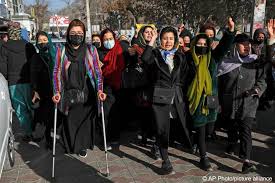Has removing women from government offices caused economic weakness?

Yes, removing women from government offices in Afghanistan can have many negative effects on the country’s economy. Women’s participation in the labor force is one of the key factors in economic growth and development, and reducing or eliminating this participation can lead to economic weakness. The reasons and effects of removing women from government offices on Afghanistan’s economy include the following:
- Reduction of skilled labor:
- Many women in Afghanistan have higher education and various specializations and played important roles in various public and private sectors. Removing women from government offices means a significant reduction in skilled labor and a reduction in the government’s ability to provide efficient services.
- Without skilled and specialized women’s workforce, various economic and social sectors such as education, health, and administrative management will suffer.
- Decreasing production and productivity:
- Reducing women’s participation in the workforce, especially in key sectors such as education and health, reduces productivity and production. Women who used to work in these sectors played an important role in improving the quality of public services and increasing productivity.
- By removing women from offices, the level of efficiency and performance of government and public sectors decreases and this leads to the overall weakness of the economy.
- increasing poverty and decreasing household income:
- Many women in Afghanistan helped to provide income for their families by working in government offices and other jobs. Excluding women from the workforce reduces household income and increases poverty.
Considering that Afghanistan is currently facing serious economic challenges, the decrease in household income can have more negative effects on the country’s economy.
-
decrease in demand and economic growth:
- As women’s income decreases and unemployment increases among them, the purchasing power of families decreases, which leads to a decrease in the demand for goods and services in the market. The decrease in demand, in turn, causes a decrease in economic growth and market stagnation.
- Women, as important consumers in the economy, had a great role in the growth of local and national markets, and the reduction of their presence can have negative effects on trade and domestic production.
-
Intensification of gender and social inequality:
- Removing women from government offices leads to the aggravation of gender and social inequality. These inequalities can bring more social and economic problems and cause public discontent and increase economic challenges.
- Women play a vital role in the social and cultural development of a country, and restricting them to household affairs or removing them from the public space leads to the reduction of the country’s growth and development potential.
-
Decreasing foreign investment and international trust:
- One of the factors that can affect the decision of foreign investors is the state of human rights and the participation of women in society. Removing women from the workforce and government offices may reduce the desire of foreign investors to operate in Afghanistan.
- In addition, international aid, which is vital for Afghanistan’s economic development, may be reduced due to violations of women’s rights, which also negatively affects the economy.

Conclusion:
Removing women from government offices and reducing their participation in the workforce has significant negative effects on the Afghan economy. This action not only reduces productivity and increases poverty, but also slows down economic growth and exacerbates social inequalities. To improve the economic and social situation of Afghanistan, the active participation of women in all sectors of society is necessary.